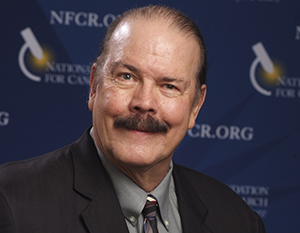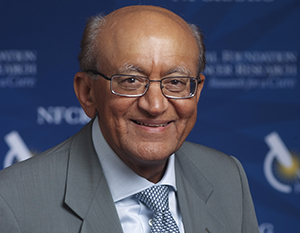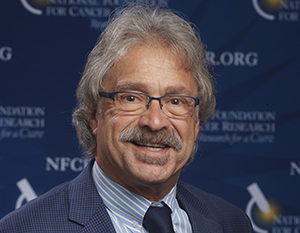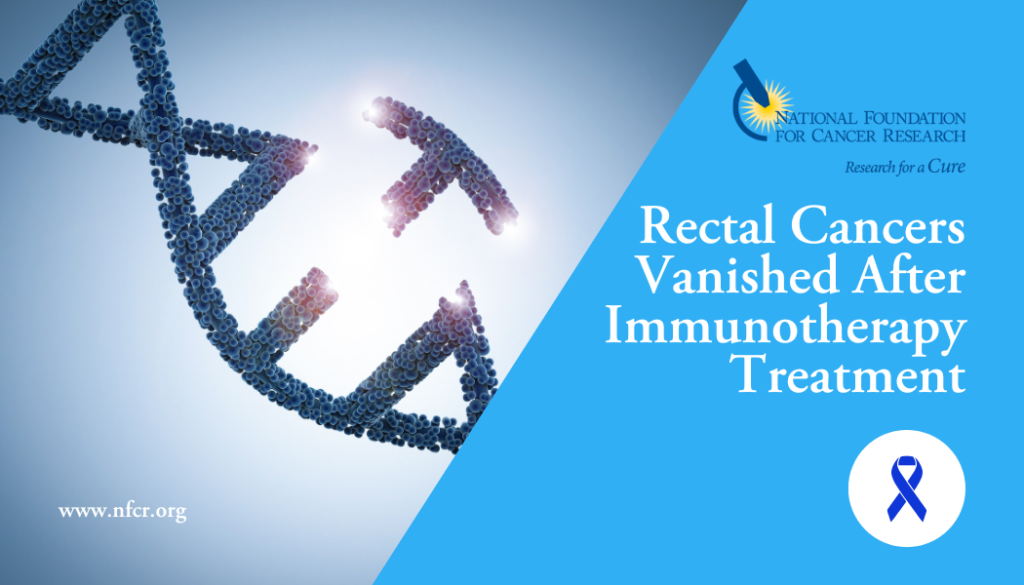Immunotherapy
What is Immunotherapy?
The immune system is the body’s defense against disease as it recognizes and destroys any foreign material that could cause harm. In some instances, the immune system can recognize cancer cells as abnormal and kill them; in others, the cancer evades the immune system wreaking havoc in our bodies.
In recent years, some of the most promising advances in cancer research involve immunotherapies – treatments that use the immune system to fight diseases like cancer. By finding new ways to help the immune system recognize cancer cells – specifically in solid tumors, and strengthen its response to destroy them, researchers are looking for long-lasting solutions to cure cancer.
Support Breakthroughs in Immunotherapy Cancer Research and Beyond.
Related Content
NFCR-Supported Research Team Working On CAR-T Immunotherapy For Pancreatic Cancer
Pancreatic cancer is one of the most lethal malignancies with few treatment options. Its five-year survival rate is only about 10% in the US. Several treatment options are available for pancreatic cancers, including surgery, chemotherapy, radiation therapy, immunotherapy, and combinational therapies. However, these therapies are ineffective for most patients, and the outcomes are far from satisfactory. Current Immunotherapy Has Limited Effects on Pancreatic Cancer Immunotherapies hold great potential for several types of cancer, but they have limitations to pancreatic cancer. Antibody-based immunotherapy, such as the checkpoint inhibitor drug pembrolizumab, only works for a small portion (1-2%) of pancreatic patients who carry the genomic abnormalities called “mismatch repair-deficient (dMMR) or “microsatellite instability stability high” (MSI-H). T-cell-based immunotherapy, such as Chimeric Antigen Receptor (CAR) T-cell therapy or CAR-T therapy, has shown limited treatment effects on pancreatic cancer because it is difficult for T-cells to penetrate the tumors and kill them. Pancreatic Cancers are Often Called “Cold Tumors” Pancreatic cancers are “cold tumors” or “immune-excluded tumors” because the cancer-killing T-cells couldn’t efficiently infiltrate the tumor and only stay at the margins. Research data shows that pancreatic ductal adenocarcinoma (PDAC) builds up a surrounding microenvironment that suppresses the cancer-killing functions of the immune system. To turn the “cold tumor” into a “hot tumor,” researchers must explore novel approaches to disrupt the tumor-friendly microenvironment around the pancreatic tumors and enable more tumor-killing T-cells to infiltrate the tumor sites. Novel CAR-T Cells May Infiltrate Pancreatic Cancer More Efficiently Avery D. Posey, Jr., Ph.D. at the Center for Cellular Immunotherapy, University of Pennsylvania School of Medicine, is leading a research team to develop a novel type of CAR-T Cell therapy to overcome the limitation of current cell therapy procedures. Unlike antibody drugs, CAR-T therapy uses living cells to treat cancer in three steps. First, doctors collect the cancer-fighting T-cells from patients. Then, specialized technicians will modify those cells in the laboratory with genetic engineering technology. The engineered T-cells will be tailored to attack the patient’s tumor specifically. They are also armed with new genes, enabling them to penetrate tumors more efficiently than the patient’s natural T-cells. As the final step, modified CAR T-cells will be infused back into the patient to let them find and kill the cancer cells. How We Make An Impact With the NFCR’s support, Dr. Posey is collaborating with Dr. Courtney Houchen at the University of Oklahoma Health Sciences Center to conduct the research. They will make the novel CAR-T cells ready for human clinical trials after generating enough data in their laboratories. Learn more about Dr. Posey’s research project on the novel CAR-T Therapy by watching this video. References: CAR T Cells: Engineering Patients’ Immune Cells to Treat Their Cancers. National Cancer Institute, March 10, 2022.
Rectal Cancers Vanished After Immunotherapy Treatment
Immunotherapy has changed the landscape of cancer medicine. The good news about its recent success in treating rectal cancer marked a new milestone in curing cancers. Rectal Cancers Are Gone After the Treatment A research paper published in the New England Journal of Medicine on June 23, 2022, reported that 12 patients with rectal cancer treated with the immunotherapy drug dostarlimab have all achieved complete remission – the cancers vanished or are undetectable after the treatment. Doctors followed up with these 12 patients for 6 to 25 months after the treatment, and the results from all patients are remarkable: The tumor is undetectable on MRI scan and endoscopic examination; No progression or recurrence had been reported during the follow-up period; No severe adverse events have been reported for all patients since the treatment. This type of outstanding treatment outcome has not happened before. Genetic Testing Played a Critical Role This unprecedented treatment outcome proved that developing genetic testing technology and applying it to cancer treatment is worth its decade-long research efforts. All patients received genetic testing before being selected for the clinical trial. These 12 patients were recruited for the trial because they tested positive for a genetic instability called mismatch repair deficiency (MMR-d). Research has shown that patients with MMR-d may respond better to dostarlimab treatment than patients without it. The genetic testing on MMR-d played a critical role in successfully treating this cohort of patients. Actually, the combination of genetic-testing-based patient selection and immunotherapy led to the complete remission of all patients in this clinical trial. NFCR is a Pioneer in Genetic Testing Research The National Foundation for Cancer Research (NFCR) is a pioneer in funding genetic testing research. As early as 2005, NFCR started to support cancer molecular profiling research at the Translational Genomics Research Institute (TGen). Today, molecular profiling and other genetic testing technologies have become powerful tools for doctors to match patients with personalized therapies for their cancers. With the rapid adoption of genetic testing technology in hospitals, we will see more successful cases like this in the future. Precision medicine combined with immunotherapy provides a better treatment option for untreatable or uncontrollable cancers under standard therapies. Reference: PD-1 Blockade in Mismatch Repair–Deficient, Locally Advanced Rectal Cancer. The New England Journal of Medicine, June 23, 2022.
5 Tips to Help Prevent Melanoma
Melanoma is the deadliest skin cancer as it could quickly spread to other organs and become an untreatable disease. New treatment options such as immunotherapy may help control some patients’ melanoma metastasis, but in most cases, metastatic melanoma still causes many death of patients each year. Prevention is better than treatment. The best way to keep skin cancers away is to prevent them from happening. To do that, people could take multiple actionable steps. The most crucial one is to avoid over-exposure to ultraviolet (UV) rays. Experts believe that 90% of all melanomas are caused by UV radiation from the sun or indoor tanning devices. By following the five tips described below, you can easily practice the sun-safety measures to prevent over-exposure to UV rays while enjoying your outdoor activities during the summertime. Tip 1: Seek Shade Seek shade when appropriate, remembering that the UV rays are the strongest between 10 a.m. and 2 p.m. Tip 2: Wear Sun-protective Clothing Wear a lightweight and long-sleeved shirt, pants, a wide-brimmed hat, and sunglasses with UV protection when possible. For more effective protection, select clothing with an ultraviolet protection factor (UPF) number on the label and ensure it is tightly woven. Tip 3: Apply Sunscreen Apply a broad-spectrum, water-resistant sunscreen with an SPF of 30 or higher to all skin not covered by clothing. Remember to reapply every two hours or after swimming or sweating. Tip 4: Avoid Indoor Tanning Salons Research has shown that exposure to UV radiation from indoor tanning devices is associated with an increased risk of melanoma and non-melanoma skin cancers. Even one indoor tanning session can increase users’ risk of developing squamous cell carcinoma by 67% and basal cell carcinoma by 29%. Tip 5: Examine Skin Regularly An essential step in skin cancer prevention is regular screenings. Dermatologists can assess and recommend how often a person needs a skin exam based on each person’s risk factors. It is recommended that individuals with a family history of melanoma or other skin cancers should have a full-body exam at least once a year. Another beneficial habit is monthly skin self-exams to check for new or changing moles. Approximately half of the melanomas are self-detected. According to the National Cancer Institute, the most common signs of skin cancer include the following skin changes: A new growth on the skin A sore that does not heal A change in an old growth Skin cancer is the most commonly diagnosed cancer in the United States, but it is also a very preventable illness. By following these five tips and taking those steps described above, your risk of getting melanoma and other types of skin cancer could be significantly reduced. Additional Reads You May Enjoy: Melanoma 101: What You Need to Know Young Adults and Cancer: What You Need to Know 9 Must-Know Facts About Sunscreen




















